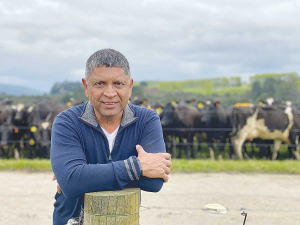Indian FTA 'opens doors for dairy'
A New Zealand dairy industry leader believes the free trade deal announced with India delivers wins for the sector.
 Southern Pastures executive chairman Prem Maan believes farming in New Zealand should be driven by the ambition to become carbon neutral.
Southern Pastures executive chairman Prem Maan believes farming in New Zealand should be driven by the ambition to become carbon neutral.
Corporate dairy farmer Southern Pastures has signed a three-year $50 million sustainability-linked farm loan with BNZ.
In a New Zealand first, Southern Pastures, which owns 20 farms, and Lewis Road Creamery, will receive financial incentives for meeting new water quality and biodiversity targets and for achieving further reductions in its already low on-farm carbon emissions.
Achievement of the targets will be directly linked to lower loan costs.
“This deal recognises that farming to mitigate climate change and environmental impacts is in our common interest,” says Southern Pastures executive chairman Prem Maan.
“In my view, farming in New Zealand should be driven by the ambition to become carbon neutral.”
Southern Pastures farms produce milk under an independently certified 10 Star Certified Values Program which stipulates strict environmental, climatic, animal and human welfare requirements. Its Waikato farms that supply Fonterra include the largest organic farm in the country.
“We use our organic farm, for example, to learn how to minimise antibiotic use,” says Maan.
“So we now use less antibiotics on all our farms than what is allowed under EU organic regulations.”
BNZ head of natural capital, Dana Muir, says Southern Pastures is a leader in the NZ primary sector with ambitious environmental goals.
It made sense to partner with them to show that capital incentives can deliver financial and environmental benefits.
“Like BNZ, Southern Pastures are driven to make a real difference improving New Zealand’s environment. The environmental targets linked to the loan are ambitious and go beyond compliance minimums – achieving them will require innovative on-farm planning, practices and reporting,” says Muir.
BNZ chief executive Angela Mentis says it has developed the innovative loan structure as part of its Sustainable Finance portfolio to help deliver carbon reductions and sustainable benefits in New Zealand.
She says that BNZ will increasingly seek to use Environmental, Social and Governance (ESG)-linked lending with New Zealand farmers, agribusinesses and other sectors to help meet New Zealand’s climate change obligations.
“Bold ESG initiatives not only help protect the environment and build Natural Capital but also increase the value of our consumer products globally and strengthen brand New Zealand.
“There is great work underway on New Zealand farms, throughout the primary sector and other sectors. We want to partner with businesses who are striving to go above and beyond compliance minimums and show what best practice in environmental management, labour and governance looks like,” she says.
As part of the loan arrangement, AsureQuality is acting as an independent on-farm auditor, visiting the farms on an annual basis to collect data and verify progress against targets. Discounts to interest rates will be applied during the term of the loan provided interim and final targets are met and verified.
AsureQuality’s environmental assurance lead, Simon Love, say it is using its expertise to turn environmental targets into measurable and auditable proof points.
Southern Pastures is a long-standing signatory to the United Nations Principles for Responsible Investment and BNZ is a member of the Climate Leaders Coalition, a signatory to the Principles of Responsible Investment and committed to the United Nations Principles of Responsible Banking and the Collective Commitment to Climate Action.
Donald Trump's latest tariff tantrum has again thrown the world of trade into a new round of turmoil and uncertainty, and NZ is caught up in it.
The third edition of the NZ Dairy Expo, held in mid-February in Matamata, has shown that the KISS principle (keep it simple stupid) was getting a positive response from exhibitors and visitors alike.
Twenty years ago, South African dairy farm manager Louis Vandenberg was sent to a farm in Waikato to provide training on Afimilk technology.
Strong farmgate milk price is helping boost investment on farms, says PGG Wrightson chief executive Stephen Guerin.
Fonterra's 460 milk suppliers in Australia, who will switch to Lactalis end of this month, are unfazed with the impending change.
The 5+ A Day Charitable Trust has launched a collection of affordable recipes designed to turn everyday vegetables into seasonal stars.
OPINION: Is it a case of over promising and under delivering? Farmers think so.
OPINION: The UK dairy industry is celebrating a win after plant-based drink maker Oatly lost a long-running legal battle over…